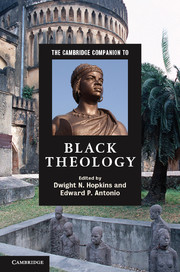Book contents
- Frontmatter
- Part I Introduction
- Part II Themes in black theology
- 6 God
- 7 Jesus in black theology: the ancient ancestor visits
- 8 Black theology and the Holy Spirit
- 9 Black theology and human purpose
- 10 Theology's great sin: silence in the face of white supremacy
- 11 Theodicy: “De Lawd knowed how it was.” Black theology and black suffering
- 12 Black theology and the Bible
- 13 Protestant ecclesiology
- 14 Roman Catholic ecclesiology
- 15 Dignity and destiny: black reflections on eschatology
- Part III Global expressions of black theology
- Further reading
- Index
- Other titles in the series
9 - Black theology and human purpose
from Part II - Themes in black theology
Published online by Cambridge University Press: 28 September 2012
- Frontmatter
- Part I Introduction
- Part II Themes in black theology
- 6 God
- 7 Jesus in black theology: the ancient ancestor visits
- 8 Black theology and the Holy Spirit
- 9 Black theology and human purpose
- 10 Theology's great sin: silence in the face of white supremacy
- 11 Theodicy: “De Lawd knowed how it was.” Black theology and black suffering
- 12 Black theology and the Bible
- 13 Protestant ecclesiology
- 14 Roman Catholic ecclesiology
- 15 Dignity and destiny: black reflections on eschatology
- Part III Global expressions of black theology
- Further reading
- Index
- Other titles in the series
Summary
In black theology, the notion of human purpose is closely tied to a perception of Jesus. In this sense, human purpose (or theological anthropology) is connected to Christology (or the life and import of Jesus the Christ). It is the human being, Jesus, who models human purpose. Therefore, in this chapter, I draw on Christological lessons in order to surface the human purpose themes of self-denial, agency, identity, and liberation. To highlight the lessons of Jesus for human purpose, I compare and contrast the relationship between black American theology and African theology. In fact, since the majority of black Americans' lineage goes back to Africa, it helps to put into conversation these two understandings of human purpose.
Theologians Josiah Young and Dwight Hopkins have contributed to informative studies demarcating the similarities and dissimilarities of black and African theologies. Their fine works respectively implicate the need for liberation theology to address the complex ethical challenge of generic (nonspecific) self-denial. The generic character in the biblical Jesus' call to discipleship in several of the Gospel narratives is rather transparent: “If any man would come after me, let him deny himself, take up his cross daily and follow me” (Luke 9:23; Mark 8:34). This is human purpose. Jesus' biblical command of generic self-denial as a voluntary optional response to his requirement of Cross-bearing discipleship presents its own theological and ethical challenge to the oppressed. It presupposes that the colonized and the colonizer of Jesus’ day will encounter the command through their own respective experiences.
- Type
- Chapter
- Information
- The Cambridge Companion to Black Theology , pp. 126 - 142Publisher: Cambridge University PressPrint publication year: 2012



